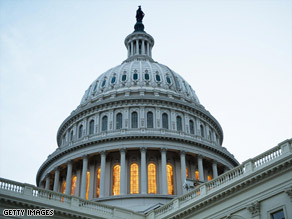
After postponing a vote on a $410 billion spending bill, Senate Democrats planned to consider Republican amendments as early as Friday to get the votes needed to move the legislation forward.
Senate Majority Leader Harry Reid, D-Nevada, delayed a vote on the spending plan late Thursday, saying he was one vote shy of the 60 needed to end debate on the bill. “At quarter to 8 tonight, I had 59 and a half votes,” Reid joked as he announced the postponement. Reid suggested that he would pick up some Republican votes if their amendments are considered. The House of Representatives passed an emergency spending bill Friday afternoon to allow the federal government to continue operating through the middle of next week. The Senate agreed to approve the temporary measure once the House passed it. The stopgap measure is necessary because the continuing resolution that provides funding for the government expires at midnight. Lawmakers will need to pass the spending bill before the measure expires next Wednesday. The Senate reconvened Friday to continue debate on the spending bill, but lawmakers weren’t expected to vote on any amendments until Monday.
Don’t Miss
Critics question Obama’s pledge to end ‘pork’
Two Democrats urge Obama to veto spending bill
Hoyer: Congress, not Obama, to decide on earmarks
Senate.gov: Omnibus appropriations bill
A final vote on the legislation is likely Tuesday, Reid said. The bill would keep the federal government running through the rest of the fiscal year, which ends in September. The omnibus bill’s price tag and its nearly $8 billion for local projects — so-called pork-barrel spending or earmarks — have made it a lightning rod for controversy as the government struggles with a tough economy. Watch CNN’s Campbell Brown chide Congress for earmarks » The projects, most of which were requested last year, range from $300,000 for the Montana World Trade Center and $381,000 for Jazz at Lincoln Center’s music education program to a much-maligned $1.7 million study on pig odor in Iowa. About 60 percent of the earmarks are from Democrats, and about 40 percent are from Republicans, according to the Taxpayers for Common Sense. The spending bill made it through the House last week. President Obama is expected to sign the bill when it reaches his desk. Obama has vowed to crack down on spending for special projects. While money for earmarks in the legislation is less than the amount in similar bills in the past, the 8,500 projects have raised eyebrows. The White House said this bill is just last year’s unfinished business — and next time, it will be different. “We’ll change the rules going forward,” White House press secretary Robert Gibbs said Wednesday when asked about the legislation. In the past few days, two Democrats — Sens. Evan Bayh of Indiana and Russ Feingold of Wisconsin — announced they would not vote for the spending bill and urged Obama to veto it if it passed.
On Thursday, U.S. Treasury Secretary Timothy Geithner was working directly with Sen. Robert Menendez, D-New Jersey, on concerns about parts of the plan that would loosen trade and travel restrictions on Cuba, said a Democratic leadership aide who asked not to be named because of the sensitive nature of the negotiations. Sen. Arlen Specter of Pennsylvania was one of several Republicans believed to be willing to support the plan as long as several more amendments are at least considered. A senior Republican aide said that GOP senators expect there to be enough support if the amendments come to the floor.